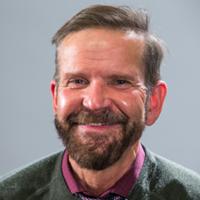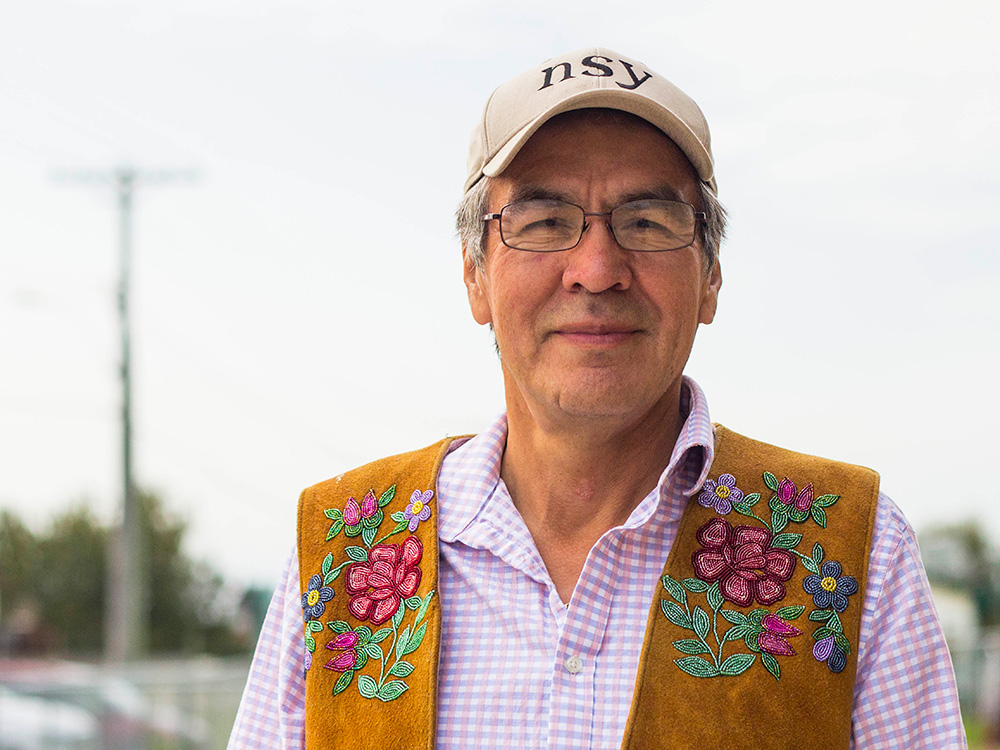Norman Yakeleya was six-years-old when he first attended Grollier Hall, a Roman Catholic-run residential school in Inuvik, Northwest Territories. Over the nearly eight years he was a student there, he suffered spiritual, cultural, physical and sexual abuse — memories of which still open old wounds and leave him too angry to recount.
He and the other students were stripped of “the names given to us by our mothers and fathers” and assigned a number. His was 153.
Yellowknife-born Yakeleya, 62, serves as both the chief of the Dene Nation and the Assembly of First Nations regional Chief for the Northwest Territories.
It is now another number — 215 — that he believes is “waking Canada up” to how at least 150,000 First Nations, Métis and Inuit students who attended residential schools were treated in life, and in death.
The May 27 discovery of the remains of 215 children buried in unmarked graves at a former residential school in Kamloops has “set us all free to tell you that we are walking on new ground now,” said Yakeleya, who oversees the residential school file for the AFN. He adds that there were 25 known residential school sites in the Northwest Territories, which also had the highest percentage of survivors in all of Canada.
In his view, the new ground begins by walking down a road to true reconciliation that will eventually lead to full self-government for Indigenous peoples.
Some important steps are needed to start that journey, beginning with a full apology from Pope Francis, in Canada, on behalf of the Catholic Church to “help the Indigenous people to begin the path of healing,” said Yakeleya, whose maternal grandmother, mother and siblings also attended residential schools in the Northwest Territories, spanning more than 100 years.
He did not hear the word “sorry” when the Pope addressed a crowd in St. Peter’s Square gathered for the Sunday Angelus noon prayer.
Francis said he was “following with pain” news of the Kamloops discovery, and that he “join[ed] with the Canadian bishops and the entire Catholic Church in Canada in expressing my closeness to the Canadian people traumatized by the shocking news.”
The pontiff urged political and religious authorities to “continue to collaborate with the determination to shed light on this sad affair and to commit humbly to a path of reconciliation and healing.”
“These difficult moments,” he said, “represent a strong call to distance ourselves from the colonial model and from today’s ideological colonizing, and to walk side by side in dialogue, in mutual respect and in recognizing rights and cultural values of all the sons and daughters of Canada.”
On Monday, Yakeleya was reading Matthew 7:7-8 in the Bible, which reads: “Ask, and it will be given you; seek, and you will find; knock, and [the door] will be opened to you. For everyone who asks receives, and he who seeks finds, and to him who knocks, [the door] will be opened.”
As the Chief told The Tyee, “I’m trying to make sense of being encouraged to read the Bible, and follow the words,” he recalled of being told that by the Grey Nuns at the residential school he attended. Yakeleya now wonders whether he was “lied to” about that biblical passage since “behind closed doors, the Roman Catholic Church does something totally evil.”
The Indigenous community is asking, he said, for not only an apology, but accountability, for the Church’s major role in the country’s residential-school system.
“We are seeking, and we have found, the culprit,” said Yakeleya. “We seek to find our loved ones, and we seek to find justice. We are knocking, but the door is not being opened to us.”
“The Pope’s advisors really need to study and live by the Holy Bible, otherwise it’s all hypocritical.”
Yakeleya, who is no longer a practising Catholic after being raised in the faith, wants Pope Francis to come to Canada and meet with the Indigenous community to personally deliver the long-sought apology.
Last Wednesday, Vancouver Archbishop J. Michael Miller released an “expression of commitment” in which he outlined measures the Roman Catholic Archdiocese of Vancouver would take “to bring life and healing” to the apology he delivered to the Truth and Reconciliation Commission in 2013.
Among the commitments, the archdiocese will be “fully transparent with our archives and records regarding all residential schools, and strongly urge all other Catholic and government organizations to do the same.”
The archdiocese will also offer “mental health support and counselling for family members and others whose loved ones may be buried on the site of the former Kamloops Indian Residential School.”
Yakeleya had an “emotional” meeting last week with Mackenzie-Fort Smith Bishop Jon Hansen, in which the Catholic head of the Northwest Territories offered his own apology.
But at a news conference in Ottawa last Friday, Prime Minister Justin Trudeau said that as a Catholic, he is “deeply disappointed” with the approach his church has taken on the residential school file. He said that despite personally asking Pope Francis to issue an apology and make church-run school records available — during the prime minister’s 2017 visit to the Vatican — “we’re still seeing resistance from the Church, possibly from the Church in Canada.”
Faith includes “forgiveness and redemption,” said Trudeau, “and I hope that we will see a more open and accountable approach [from] the Catholic Church.”
Also on Friday, the United Nations Human Rights Office of the High Commissioner issued a statement calling on the federal government and the Holy See (the central governing body of the Catholic Church) to “conduct prompt and thorough investigations” into the discovery of the mass unmarked gravesite in Kamloops.
Indigenous leaders have called for the implementation of the 94 Calls to Action from the Truth and Reconciliation Commission, including four that have particular relevance in the aftermath of Kamloops.
Recommendations 73–76 call for:
- An “online registry of residential school cemeteries, including, where possible, plot maps showing the location of deceased residential school children”;
- “Inform[ing] the families of children who died at residential schools of the child’s burial location, and to respond to families’ wishes for appropriate commemoration ceremonies and markers, and reburial in home communities where requested”;
- “Strategies and procedures for the ongoing identification, documentation, maintenance, commemoration, and protection of residential school cemeteries or other sites at which residential school children were buried,” including “the provision of appropriate memorial ceremonies and commemorative markers to honour the deceased children”; and
- That “parties engaged in the work of documenting, maintaining, commemorating and protecting residential school cemeteries” have strategies led by the Indigenous community “most affected” and that “Aboriginal protocols [must]l be respected before any potentially invasive technical inspection and investigation of a cemetery site.”
Yakeleya also wants recommendation 46 advanced. It calls for a “Covenant of Reconciliation” that would include an apology from the Catholic and Anglican churches, which ran residential schools. Yakeleya told The Tyee that the covenant is close to being finalized.
He and other Indigenous leaders have also called for a sweeping search on the grounds of every residential school in Canada — a system in which more than 4,100 children died, according to the findings of the Truth and Reconciliation Commission.
The final TRC report states: “Many, if not most, of several thousand children who died in residential schools are likely to be buried in unmarked and untended graves. Subjected to institutionalized neglect in life, they have been dishonoured in death.”
The National Centre for Truth and Reconciliation at the University of Manitoba has now added lists of names of the children it has on record of perishing at residential schools across Canada — including 51 children who died or went missing while at the Kamloops Indian Residential School and six children who died or went missing at the school Yakeleya attended.
It is believed the names represent an incomplete list, leaving many more children who died at schools unaccounted for.
“We’ve got to find our children. We’ve got to know what happened to them — and that’s when the truth will set us free,” said Yakeleya, who wants a criminal investigation launched regarding the Kamloops discovery and any future similar findings at other sites. “The federal government and the churches that ran the residential school have to be held accountable.”
Former TRC commission chair Murray Sinclair told members of the House of Commons Standing Committee on Indigenous and Northern Affairs on Thursday that such an investigation “should be overseen by a parliamentary committee that will ensure that it is done in a proper way, as opposed to having anyone within the Justice Department or the Department of Indigenous Affairs controlling that process.”
Last week also saw federal Crown-Indigenous Relations Minister Carolyn Bennett issue a statement to mark the sixth anniversary of the TRC’s calls to action and reiterated the government’s 2019 budget commitment to provide $27 million in funding to help locate children who died at residential schools.
“A drop in the bucket,” responded Yakeleya. “Shame on them.”
Last Thursday, federal NDP Leader Jagmeet Singh presented an Opposition Day motion calling on the federal government to, in part, end its legal battle against residential school survivors. The motion passed (271-0) on Monday, with Liberal cabinet ministers abstaining. The prime minister did not cast a vote.
Also last Thursday, Bill C-5, which creates a National Day for Truth and Reconciliation to be observed as a statutory holiday on Sept. 30 every year, received royal assent.
Trudeau told reporters that his government “will not be dictating” to communities regarding the search for children who died at residential schools and would defer to them to be “the centre of and in charge of any and all next steps.”
For Yakeleya, the next steps are about moving beyond the trauma he and others experienced at residential schools.
At Grollier Hall, where Dene, Métis and Inuvialuit children from about 16 communities in the Northwest Territories were students, Yakeleya and the others were only allowed to speak English, as Indigenous languages were considered “of the devil.”
If children dared speak in their own tongues, “the Grey Nuns would punish us by slapping our mouths or giving us a bar of soap to wash out our mouths,” recalled Yakeleya.
For him, it is also about taking concrete steps forward, including any federal ministry related to Indigenous affairs being dismantled and replaced with a new department responsible for reconciliation and healing. He also wants the federal government to end, not just reduce, the number of Indigenous children in care.
“A lot of our children are in foster care, which is the modern-day residential school system,” Yakeleya said. “We want to bring our children home while they’re still alive.”
Ultimately, he would like the Indian Act replaced with a “self-government act” that would lead to the establishment of a sovereign Indigenous nation with its own parliament and citizenship “on the same par as Canada.”
“This is all our land,” said Yakeleya, who sees Indigenous peoples coming “full circle” after centuries of not holding control of that territory and receiving “infinite justice in a finite world.”
And he added: “Martin Luther King had a dream. The Dene also have a dream — and a desire burning deep within our souls for justice, self-determination, reconciliation and healing.” ![]()
Read more: Indigenous, Rights + Justice, Federal Politics

















Tyee Commenting Guidelines
Comments that violate guidelines risk being deleted, and violations may result in a temporary or permanent user ban. Maintain the spirit of good conversation to stay in the discussion.
*Please note The Tyee is not a forum for spreading misinformation about COVID-19, denying its existence or minimizing its risk to public health.
Do:
Do not: